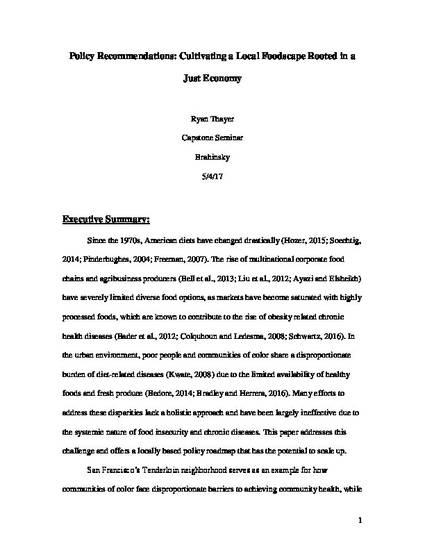
Thesis
Policy Recommendations: Cultivating a Local Foodscape Rooted in a Just Economy
(2017)
Abstract
Since the 1970s, American diets have changed drastically (Hozer, 2015; Soechtig, 2014; Pinderhughes, 2004; Fr eeman, 2007). The rise of multinational corporate food chains and agribusiness producers (Bell et al., 2013; Liu et al., 2012; Ayazi and Elsheikh) have severely limited diverse food options, as markets have become saturated with highly processed foods, whi ch are known to contribute to the rise of obesity related chronic health diseases (Bader et al., 2012; Colquhoun and Ledesma, 2008; Schwartz, 2016). In the urban environment, poor people and communities of color share a disproportionate burden of diet - rela ted diseases (Kwate, 2008) due to the limited availability of healthy foods and fresh produce (Bedore, 2014; Bradley and Herrera, 2016). Many efforts to address these disparities lack a holistic approach and have been largely ineffective due to the systemi c nature of food insecurity and chronic diseases. This paper addresses this challenge and offers a locally based policy roadmap that has the potential to scale up.
San Francisco’s Tenderloin neighborhood serves as an example for how communities of color fa ce disproportionate barriers to achieving community health, while
also holding the potential to serve as a model for how food can be used to address systemic issues in similar communities. The Tenderloin is one of San Francisco’s densest, poorest, and most culturally diverse neighborhoods. This paper briefly outlines the historical context that has contributed to inequitable foodscapes in San Francisco’s Tenderloin and provides policy recommendations to support a more equitable food economy. The paper draws on participant observation with the Tenderloin Healthy Corner Store Coalition (TLHCSC) , which was formed in 2012 to cultivate community leadership and support local economic development, through the conversion of corner stores into healthy retailers that sell fresh produce. This paper is grounded in this “ healthy retail work ” as an important pillar in addressing inequitable access to healthy foods in the urban environment. Using healthy corner stores as a nexus of economic development, community empowermen t, and sustainable food practices I provide policy recommendations to support the Tenderloin and neighborhoods like it across the country in becoming healthier and more equitable.
The recommendations in this paper serve as a roadmap for community based or ganizations and policy makers to increase access to healthy food, reduce chronic health disparities, and strengthen neighborhood economies while establishing processes that foster leadership development on the local level. By doing so, low - income communiti es like the Tenderloin will become healthier and remain resilient in the face of gentrification and displacement.
Keywords
- food justice,
- policy,
- food access,
- food security,
- food system,
- economic development,
- food economy,
- racial justice
Disciplines
Publication Date
Spring May 4, 2017
Degree
MA
Field of study
Urban Affairs
Department
Public and Urban Affairs
Advisor
Rachel Brahinsky
Citation Information
Ryan Thayer. "Policy Recommendations: Cultivating a Local Foodscape Rooted in a Just Economy" (2017) Available at: http://works.bepress.com/ryan-thayer/2/
Creative Commons license

This work is licensed under a Creative Commons CC_BY International License.